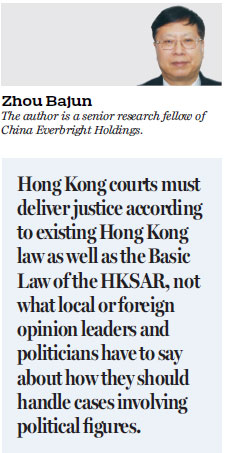Attack on jail terms amounts to assault on entire legal system
Updated: 2017-08-23 07:15
(HK Edition)
|
|||||||||
The Basic Law of the Hong Kong Special Administrative Region stipulates that the SAR would implement the "one country, two systems" policy and maintain its existing capitalist system and lifestyle for 50 years. That is why the common-law system, which was brought to Hong Kong by Great Britain more or less the same way it did to the United States, has remained intact and functioned very well in the past 20 years. Hong Kong's judicial independence and professionalism of the legal community have always been recognized by their Western colleagues for obvious reasons.
However, Hong Kong's judicial independence and the professionalism of its legal community are now targets for certain Western commentators and politicians because of two cases handled by the High Court recently. The Western verbal attacks began after the Court of Appeal overturned a lower court's sentence on 16 defendants found guilty of using violence or inciting violence during protests outside the SAR government complex in June and September 2014, and replaced the community service sentences with prison terms, including six, seven and eight months for three then student leaders Joshua Wong Chi-fung, Alex Chow Yong-kang and Nathan Law Kwun-chung, respectively, for inciting and participating in a violent protest. Those three young defendants happened to be leaders of the illegal "Occupy Central" movement in the same year as well.

Western media outlets critical of the Court of Appeal decision included The New York Times, which carried an article demanding the Norwegian Nobel Committee award the Nobel Peace Prize to Wong, Law and Chow. Not to be ignored on such occasions, Chris Patten, the last British governor of Hong Kong, asserted publicly that those three names would be entered in some history books.
Such unprovoked hostility toward Hong Kong's judiciary naturally alarmed the legal community here. The Hong Kong Bar Association and Law Society, in a rare move, issued a joint statement in support of the Court of Appeal decision and dismissing outsider bad-mouthing as ill-advised and irresponsible.
Some people may wonder why Hong Kong's judiciary and legal community suddenly found themselves at serious odds with certain Western media and politicians despite all being beneficiaries of the same common-law system and philosophy, with very similar laws and legal traditions.
It should be noted that the Court of Appeal made the above decisions entirely according to existing laws of the HKSAR to honor its responsibility to protect the interests of Hong Kong society. On those two cases the lower court and Court of Appeal, though apparently not on the same page over the severity of sentences, agreed the 16 defendants were guilty as charged. It shows the two courts are both committed to protecting the interests of Hong Kong society. The judicial apparatus is well aware of its responsibilities and understands the interests of Hong Kong society depend on social stability and public order, which require effective rule of law. No matter what excuses those young defendants were using, they broke existing Hong Kong laws and posed direct challenges to its rule of law as we know it.
So far no Western government has openly criticized the above-said decisions of the Court of Appeal. In other words, those who did one way or another can be seen as voicing the concerns of certain Western political forces over their own interests.
As for Patten, the last colonial governor responsible for "sneaking" very limited Western democracy into Hong Kong in violation of the Sino-British Joint Declaration, which gave birth to the opposition camp, he cares only about continuation of his "legacy" in Hong Kong. And by declaring the names of Wong, Law and Chow would be entered in history books he really meant he should be remembered for what he did in Hong Kong.
The truth is Patten's "political reforms" almost derailed the smooth transfer of the sovereign rule over Hong Kong from Britain to China. The worsening political confrontation waged by the opposition camp against Beijing and the SAR government after July 1, 2003 can be credited to his last-minute meddling, at least to some extent. Then there are those Western "opinion leaders" who take great pleasure in cheering and supporting all attempts to destabilize China, including Hong Kong, in the name of "freedom and democracy". They are oblivious to the fact that Western-styled liberalism has been in serious disrepair in their own countries in recent years. They don't care how hypocritical they sound to the rest of the world as long as their twisted fantasy is heard through such influential media outlets as The New York Times. And their eagerness to evoke the same political problems in other countries is matched only by their ignorance of reality.
The same common-law system serves different national interests in different countries. Hong Kong courts must deliver justice according to existing Hong Kong law as well as the Basic Law of the HKSAR, not what local or foreign opinion leaders and politicians have to say about how they should handle cases involving political figures.
(HK Edition 08/23/2017 page7)